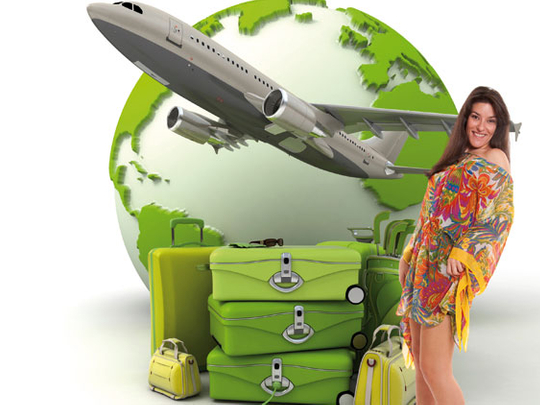
The extras you pay on flights with no-frills airlines can be so expensive that they take the budget out of budget flying.
While their basic fares can be cheap, once you have added on charges for bags, debit-card payments, checking in and getting a decent seat — which all used to be included in the standard fare — you can end up paying as much as an additional £100 (Dh565) a head on return flights.
But there are ways to minimise the cost of the extras — and in some cases, avoid paying them at all. Here's how.
Baggage charges
Having bags to check in to the hold is the biggest, most painful extra. Solutions? If possible, travel with only hand luggage. Be sure of the maximum weight and the size of carry-on bags, as limits vary by airline. Some airlines have no restriction on how heavy the bag can be but in others, it can't be more than 5kg. Airlines are sticklers for rules, so don't exceed limits. If in doubt, use the bathroom scales before you leave home, as excess weight charges are punitive, sometimes as much as £20 (Dh113) per extra kilo.
And if you do need to check in bags, always pay online, in advance. Though the cost is still extortionate — say, to about £15 (Dh85) per bag per flight or £20 (Dh113) — it's normally half, sometimes less, than what you have to cough up at the airport. Again, check the maximum weight allowed for each bag. Typically, it's 20kg but some airlines lower the ceiling to a stingy 15kg.
While some companies allow sharing or pooling of baggage allowances, others don't. Check the rules on the airlines' websites.
Payment charges
Fees for paying for airline tickets with credit and debit cards have soared in the past few years. In some carriers, they stand at an eye-popping £5 (Dh28) per person per return flight. Such charges bear no relation to the costs airlines incur for taking payments with the cards. In short, they are a racket.
Solutions? So as to be able to say that their credit/debit card charges are optional, most low-cost airlines do not charge for using a Visa Electron card. This is a basic version of a debit card linked to a bank account, with no overdraft facility. The Halifax (www.halifax.co.uk) offers the card.
There was a time when you could circumvent an airline's card charges by paying with a Visa Electron but not any more. At present, the only way of buying flight tickets without incurring extra fees is by using a Mastercard prepaid card. Though such cards can be obtained free via portals such as www.fairfx.com/travelmail, when you use it to buy a ticket, you will have to pay an extra fee. But this is still a lot less than most airlines' credit/debit card fees.
Also note that most airlines' debit-card fees are lower than their credit-card fees. However, if you pay with a credit card, you get financial protection against the airline going bankrupt — something to bear in mind if booking with a lesser-known airline.
Check-in charges
Some low-cost airlines charge extra just for checking in for their flights. But there are ways to avoid this annoying cost.
Solutions? Last year, one of the carriers abolished airport check-in and began charging £5 (Dh28) per flight for checking in online. The only way to escape the fee is by bagging the cheapest promotional fares, as the charge isn't applied to them. Don't forget to bring a print of your boarding pass to the airport: Without it, the company will charge you £40 (Dh226). With another airline, check-in fees are also applied to all passengers but are much lower if you check in online with just hand luggage (say, £1, or Dh6, per flight) than at the airport with hold luggage (£6, or Dh34, per flight). Some other companies charge only for checking in at the airport. So check in online.
Boarding and seating charges
Some airlines charge extra for priority or speedy boarding — letting you be in the first group to board and, in theory, get the seats you want. Some charge £4 (Dh23) per person per flight for this privilege while others charge £6-£8 (Dh34-Dh45). Other low-cost airlines charge extra for pre-booking specific seats and sometimes about £15 (Dh85) for an emergency-exit seat.
Solutions? Skip priority/speedy boarding. Many regular travellers question whether it is worth it— particularly when you're bussed from terminal to flight, as boarding groups can get mixed together. Also, after speedy boarders, some airlines let families with children up to the age of 5 and elderly and disabled people board next. So if you fit into these categories, you shouldn't need to pay extra.
With some other airlines, if you don't want to fork out extra for pre-booking specific seats, check in early and, if possible, online.
Charges for unwanted extras
European Union rules state that when you go through the online booking process, airlines should not automatically opt you in to extra fees that are not compulsory. However, some airlines still do this. You have to click "Remove" to avoid paying for what it calls its great-value travel insurance — which you may well not need if, say, you have annual travel insurance.
Solution? Check all the opt-in/opt-out boxes when booking.
Charges for changes
Accidentally select the wrong flight times or dates when booking online and, with some airlines, you're looking at a minimum of £25 (Dh141) per person per flight to rectify matters. Mistakes with names can be much dearer — a name-change with some of the companies costs £100 (Dh566) or £150 (Dh848), if you make the alteration at the airport.
Solution? Go through all the details before clicking to purchase. Make sure names on the booking are spelt the same as in passports.
Telephone booking charges
Most airlines offer a discount for reservations made on their website or via their call centre. With some carriers, tickets booked on the phone cost £15 (Dh85) extra per person per return flight and the calls themselves will be costly, as you need to book on premium-rate numbers.
Solution? Book online.
Top tips for happy hols
Despite the present air-travel restrictions, it’s the time of year for summer-holiday planning. But we all want to get the maximum enjoyment from our expensive travels. The key is to make your holiday as memorable as you can.
Here are tips for having a perfect break:
Where to go
Beach, mountains? Hot, warm, dry, or snow? This year, take a bit longer to think about where you want to go.
Read the holiday brochures but don’t forget they will try to sell you a specific resort — and want to keep you inside the gates.
For a holiday experience you will remember, try exploring further than the hotel. Find out more about the region and country you want to visit when planning your hols. It’s what the internet was invented for.
If you want hot, it’s difficult to beat the tropics, where I’ve spent much of the past four years travelling and filming. But closer to home, Europe still has much to offer.
Greece has some of the finest isles on the planet. My favourite is Symi, just off Rhodes. I think it’s the most beautiful island in Greece. The harbour hillside is lined with Neo-Classical buildings — and arriving by boat at dusk is a magical experience.
How to get there
It’s not for everyone but travelling overland to get to your destination is a guaranteed way of ensuring a more rewarding trip.
Rather than shuffling on to a budget flight as self-loading cattle, I’m a huge fan of travelling by train.
Realistically, we’re usually limited to Europe, though I’ve been as far as Istanbul by rail. Have a look at Seat61.com and plan a break where the landscape unfolds outside the carriage window and the journey is part of the adventure.
Exploring the unknown
Don’t be afraid to head off the beaten track. We’re often sold a vision of the world as a frightening, dangerous place but in reality, the rest of the world is friendly and endlessly hospitable.
The further you stray from the tourist traps, the warmer the welcome and the more authentic and memorable the experience.
To return with the virtuous glow of a responsible tourist, try independent travel by avoiding resorts, cruise ships and hotel chains. Instead, put your money into local guesthouses and restaurants. And while there are certainly environmental costs to travel, remember your money can have huge benefits: Tourists fund wildlife sanctuaries and nature reserves.
For those travelling further afield, my top recommendation is the island of Madagascar. Cut off for an age, the wildlife, plants and trees have evolved into spectacular forms.
Do your research
There’s a certain excitement to arriving somewhere without a clue about where to stay or what to do. But those of us lacking the thick wallets needed for travel spontaneity need to do a bit of planning.
There are guidebooks to almost everywhere. You don’t have to rely on every word but why not take advice from those who have visited before? Check medical advice before travelling, don’t forget your jabs and if you need antimalarial medication, take it. Malaria has killed half the humans who have ever lived, so don’t underestimate the threat.
Getting past the language barrier
Learn just a little about the local language and customs. Being able to say “Thank you”, “Sorry” and “He’s buying the round” will get you through most situations.
For the rest of life’s essentials, swallow your reserve and try a bit of body language.
I’ve travelled to 100 countries without fully mastering English, let alone any other language. It helps to speak a mix of Russian, Arabic and French but you can get by with a phrasebook and a smile.
Remove your sunglasses, because people need to see your eyes when you’re talking.
Escaping the hotel
I don’t enjoy all-inclusive hotels. They’re a sanitised, expensive alternative reality where the only locals you meet wear name badges.
Try not to be lulled into lying by a pool with an iPod. You can do that at home under a sunbed. Get out!
Most hotels offer trips into town or minibus tours. And they should also be able to suggest a cheap local guide who can escort you to their favourite eatery and watering hole, so you can see how the locals live.
Try new foods, ask questions, make friends. It’s the crazy characters we meet that make a trip memorable.
But when you fall into a cab after enjoying the local refreshments, remember the seatbelts. My top travel tip is simple: Buckle up abroad.
Having a holiday that lingers
Travelling is the most extraordinary privilege and should be one of the most memorable events of your life. Plan carefully, spend wisely. You worked hard for it. Happy travels.








